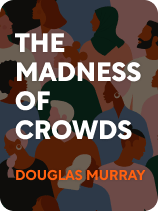

This article is an excerpt from the Shortform book guide to "The Madness of Crowds" by Douglas Murray. Shortform has the world's best summaries and analyses of books you should be reading.
Like this article? Sign up for a free trial here.
Is some science being canceled? If so, why? What issues are being targeted?
Douglas Murray says that woke ideology harms free speech in a number of ways, not the least of which is in scientific discussions. He argues that science hasn’t corroborated many of the core assumptions now associated with Leftist views of certain topics, but the ideology presents these assumptions as settled facts.
Continue reading to learn about “woke science,” according to Murray.
Woke Science
Murray asserts that debate around these “off-limit” topics is quashed—the threat of cancel culture silences any opinion inconsistent with the New Ideology. However, Murray believes that many of these topics still deserve rigorous public debate due to the true lack of scientific consensus surrounding them.
According to Murray, one issue affected by woke science is whether or not homosexuality is a fixed state of being. The New Ideology believes that homosexuality is a fully natural, immutable feature of a person’s identity, and it argues that denial of this is an act of discrimination. However, Murray points to recent statements from both the Royal College of Psychiatrists and the American Psychological Association that indicate a lack of consensus on this issue. Instead, it seems there’s still debate about whether same-sex orientation is a product of nature or nurture, and whether it’s a permanent fixture of identity or something that can be changed.
Another topic that, in Murray’s view, is a victim of woke science and deserves more scientific discussion is transgenderism. He notes that gender-affirming surgery and hormone therapies may damage individuals’ long-term health—for instance, by causing irreversible sterility. However, parents of transgender children are often discouraged or intimidated from asking questions about these effects for fear of damaging or worsening their children’s mental states.
(Shortform note: Some medical professionals have also reported possible adverse side effects and long-term complications of gender-affirming therapies. For example, patients given feminizing hormones may be at greater risk for breast cancer than cisgender males. Other possible complications include deep vein blood clots, infertility, diabetes, and increased potassium in the blood. Physicians will typically assess a patient’s health before introducing the hormone and try to determine if the patient has a predisposition to any relevant risk factors.)
Finally, Murray also views bias tests, such as the Implicit Association Test (IAT), as scientifically problematic. These tests aim to uncover unconscious biases in the subject, such as acceptance of harmful racial stereotypes. Murray notes that there’s a lack of empirical consensus on these methods’ accuracy. However, they’ve still encouraged a neurotic tendency for white people in particular to suspect themselves of prejudices they likely don’t have, as well as triggering guilt over participating in systemic oppression against minorities that doesn’t exist.
(Shortform note: Some employers encourage their employees to undergo implicit bias training to combat their unconscious biases and increase their empathy toward people from different backgrounds. This often includes making participants more aware of the negative, unconscious judgments they might reach about minorities and recording the progress they make in adjusting them. However, the results of implicit bias training are inconclusive—there’s little evidence that they significantly change people’s behavior in the long term. Further, when poorly administered, the training can make white participants feel angry and threatened, possibly worsening their implicit bias.)
| Can Sexual Orientation Be Changed? Conversion or Reparative Therapy The possibility that same-sex orientation can be altered provides the basic grounds for the idea of “conversion therapy” or “reparative therapy”: the therapeutic attempt to change someone’s sexuality from homosexual to heterosexual. Most current approaches to conversion therapy have adopted conventional therapeutic tools, including those from cognitive behavioral and talk therapy. Others may use more unconventional methods like hypnosis and prayer. Some others employ aversion therapy—forcing someone to undergo deliberately unpleasant experiences, like induced vomiting or electroshock, to deter and ultimately eliminate homosexual behavior. This practice is considered controversial due to its potential for physical harm. As of 2023, conversion therapy is rejected as unethical, ineffective, or both by organizations such as the American Academy of Pediatrics and the American Psychological Association (APA). Many US states and territories have some form of ban on the practice. |

———End of Preview———
Like what you just read? Read the rest of the world's best book summary and analysis of Douglas Murray's "The Madness of Crowds" at Shortform.
Here's what you'll find in our full The Madness of Crowds summary:
- That Western society is consumed by social justice and identity politics
- Why we must combat this ideology and restore opportunities for disagreement
- How conservative viewpoints are being silenced and possible remedies






